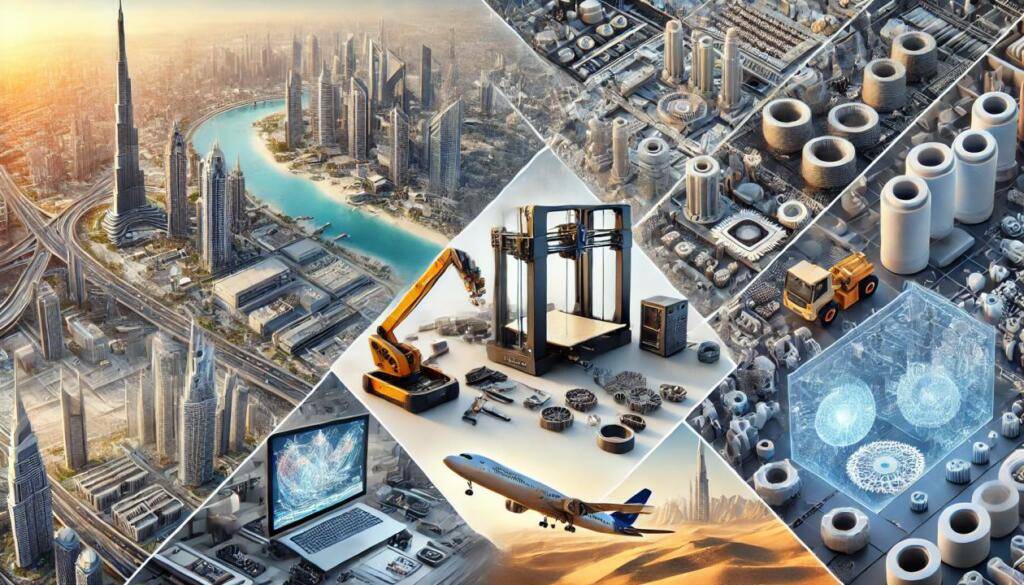The Middle East is experiencing a transformative surge in additive manufacturing (AM), impacting a variety of sectors from construction to aerospace and beyond. This growth is indicative of the region’s aim to redefine traditional industries through technology, underlining the necessity of a unifying event like the AM Conclave to accelerate progress and innovation.
Table of Contents
Construction and Infrastructure
The integration of 3D printing in construction is rapidly advancing in Dubai. Trakhees granted the first construction license for a 3D printed project to Nakheel for the Al Furjan Hills, completed impressively in 20 days. This milestone reflects a significant commitment to embedding AM within urban development, supported by governmental initiatives such as the Dubai Economic Agenda D33.
In Saudi Arabia, the world’s first 3D-printed mosque has been completed in the Al-Jawhara suburb of Jeddah, covering an area of 5,600 square meters. Completed in six months using advanced 3D printing technology from Guanli, the mosque integrates design elements to enhance natural lighting and promote a serene environment for worshippers. This milestone establishes a new standard for architectural development in the region, demonstrating the potential of 3D printing in large-scale infrastructure projects.
Dubai Municipality ‘s initiative to install 40 3D printed seats in Uptown Mirdif and Al Khazzan Parks further demonstrates the utilization of AM for public infrastructure, enhancing both functionality and sustainability.

Additionally, PrintStone 3D received Dubai Municipality accreditation after successfully completing the 3D printed Gate House, and Emaar unveiled Dubai’s first 3D-printed villa with smart technologies at Arabian Ranches III, signifying major strides in residential construction
The Dubai Municipality’s recent launch of a pioneering guideline for the use of 3D printing technology in construction marks a significant milestone for the UAE and the broader Middle East region. This initiative, endorsed by His Highness Sheikh Mohammed bin Rashid Al Maktoum, underscores Dubai’s commitment to becoming a global and regional hub for 3D printing technologies. Aimed at achieving the strategic goal of constructing 25% of new buildings using 3D printing by 2030, this guideline not only fosters innovation but also enhances efficiencies, reduces waste, and strengthens the local construction industry’s competitiveness.
By establishing clear criteria for 3D concrete printing, from design approval to on-site building control standards, Dubai is setting a benchmark for the adoption and safe implementation of advanced construction methodologies. This step is poised to attract leading companies to the region, propelling economic growth and technological advancement in the construction sector.
Aviation and Manufacturing
The sector is also witnessing significant advancements with the involvement of companies like AM Craft – Aviation Additive Manufacturing Services , which recently expanded its polymer additive manufacturing to Dubai. AM Craft, in collaboration with Paradigm 3D, has begun producing 3D-printed aviation parts that comply with strict aerospace-specific regulations.
Maritime Innovation
Innovative strides in maritime transport are exemplified by the launch of the world’s first 3D-printed abra by Dubai’s Roads and Transport Authority , enhancing the efficiency and sustainability of Dubai’s water transport system.

The 3D-Printed Abra was manufactured by Al Seer Marine Company in Abu Dhabi, in collaboration with several global companies.
Advanced Manufacturing for Spare Parts
Significant developments in spare parts manufacturing are underway, as seen with Immensa and DNV releasing guidelines for the digitization of spare parts, which could greatly impact inventory management in the energy sector. Similarly, the Saudi Electricity Company ’s collaboration with NAMI to develop a digital inventory for 3D printed spare parts marks a pivotal development towards enhancing supply chain reliability and cost-efficiency.
Immensa also announced a strategic partnership with Oman based INTAJ SUHAR FOR ADVANCED MANUFACTURING LLC to enhance in-country manufacturing by integrating Immensa’s expertise in digital inventory solutions and additive manufacturing with ISAM’s local capabilities. This collaboration will help strengthen Oman’s manufacturing sector, accelerate technological adoption, and boost the local economy by enhancing the energy supply chain and localizing the production of spare parts.
Adding to this landscape, Pelagus 3D has partnered with Immensa, MENA’s largest digital manufacturer, to develop spare parts for the maritime and energy industries. This strategic collaboration combines Pelagus 3D’s Pelagus platform with Immensa’s expertise in digital inventory solutions, aiming to streamline supply chains, expand OEM networks, and improve service provision across the MENA region.
Food Industry Innovation
Steakholder Foods is pushing the envelope in the food sector by introducing 3D-printed plant-based products in the UAE, aligning with the country’s food security goals and innovative production strategies.
Role of AM Conclave
The diversity of these advancements underlines the crucial role of the AM Conclave, MENA’s premier additive manufacturing and 3D printing tradeshow. By bringing together stakeholders from across industries, the conclave serves as a pivotal platform for showcasing innovations, exchanging ideas, and fostering collaborations that are essential for the regional growth of AM technologies. It provides a venue for discussing challenges, exploring new opportunities, and aligning efforts with regional strategic objectives.
AM Conclave is collaborating with Sindan UAE this year. This collaboration marks a significant step forward in advancing additive manufacturing in the MENA region. As the leading innovator in additive manufacturing, Sindan delivers strategic solutions across defense, aerospace, and medical sectors. Our commitment to precision and innovation drives us to bring visions to life and inspire the next generation with the latest technological advancements. This partnership will further contribute to the advancement of the UAE’s technological ecosystem.
As the Middle East continues to advance its AM capabilities, the AM Conclave remains instrumental in promoting innovation, facilitating knowledge transfer, and catalyzing the broader adoption of additive manufacturing technologies across varied sectors. This forum is vital for maintaining the momentum in the region’s AM landscape, ensuring it remains at the cutting edge of global manufacturing innovation.
Note: This article attempts to include major developments on 3D Printing and Additive Manufacturing in the past 4 months in the Middleeast


